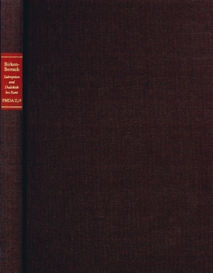Hanno Birken-Bertsch: Subreption und Dialektik bei Kant
Der Begriff des Fehlers der Erschleichung in der Philosophie des 18. Jahrhunderts.

›Subreption and Dialectic in Kant‹ has two goals. In the first place, it traces the history of the concept of subreption up to the philosophy of Kant. Secondly, it investigates the relation between Kant’s thesis that there is a dialectic of reason and the doctrine of subreption. – In Roman law, someone commits a subreption when he attains an advantage through the concealment of important facts. In philosophy the concept of subreption is deployed from the time of Jungius and Leibniz (using the Latin term »vitium subreptionis« or »error of subreption« in order to criticize methodical errors in philosophical argumentation. In the first half of the eighteenth century, Christian Wolff applies the concept to errors in the empirical verification of statements. The peak of the development of the concept is Kant’s Dissertation of 1770, in which the chapter on the method of metaphysics centers on how to avoid the »vitium subreptionis metaphysicum«. In the Transcendental Dialectic of the ›Critique of Pure Reason‹, Kant overlays the critique of subreption with a theory of dialectical reason. Yet reason does not appear to be the source of this dialectic. We are therefore left with subreption – a failure of judgment – as the only way of explaining the errors considered in the Transcendental Dialectic. – This work provides the first investigation of the concept of subreption. At the same time it demonstrates the great importance of the concept for the elaboration of Kant’s philosophy.
Reviews
»Well documented and well argued little volume.«
»Es ist das Verdienst der vorliegenden Arbeit, die vergessene Geschichte der Subreption und damit einen spannenden Aspekt des Kantischen Denkens wieder ins Gedächtnis zu rufen; sie ist eine unentbehrliche Grundlage und hoffentlich auch Anlaß für weitere Subreptionsforschungen, vielleicht nicht nur in Bezug auf Kant.«
All volumes
- Macor: Die Bestimmung des Menschen (1748–1800) – available
- Schwaiger: Alexander Gottlieb Baumgarten – ein intellektuelles Porträt – available
- Facetten der Kantforschung – available
- Dieringer: Kants Lösung des Theodizeeproblems – available
- Nakazawa: Kants Begriff der Sinnlichkeit – available
- Kant im Spiegel der russischen Kantforschung heute – available
- Birken-Bertsch: Subreption und Dialektik bei Kant – available
- Schröpfer: Kants Weg in die Öffentlichkeit – available
- Böhr: Philosophie für die Welt – available
- Lutterbeck: Staat und Gesellschaft bei Christian Thomasius und Christian Wolff – available
- Pozzo: Georg Friedrich Meiers ›Vernunftlehre‹ – available
- Schwaiger: Kategorische und andere Imperative – available
- Hinske: Zwischen Aufklärung und Vernunftkritik – available
- Oberhausen: Das neue Apriori – available
- Kawamura: Spontaneität und Willkür – available
- Schwaiger: Das Problem des Glücks im Denken Christian Wolffs – available
- Conrad: Kants Logikvorlesungen als neuer Schlüssel zur Architektonik der Kritik der reinen Vernunft – available
- Theis: Gott – available
- Hauser: Selbstbewußtsein und personale Identität – available
- Der Aufbruch in den Kantianismus – available
- Carboncini: Transzendentale Wahrheit und Traum – available
- Gawlick / Kreimendahl: Hume in der deutschen Aufklärung – available
- Altmann: Die trostvolle Aufklärung – available
- Schneiders: Aufklärung und Vorurteilskritik – Reprint in preparation
- Engfer: Philosophie als Analysis – available
- Subject Areas
- New Publications
- ---
- Critical Editions
- Collected Works
- Series
- Arbeiten und Editionen zur Mittleren Deutschen Literatur
- Aufklärung und Revolution
- Böhme-Forschungen
- Bibliothek 1800
- Clavis Pansophiae
- Collegium Philosophicum
- Commentaria in Aristotelem Graeca
- Doctrina et Pietas
- Editionen zur Frühen Neuzeit
- Elea
- Europäische Literatur der Frühen Neuzeit
- exempla aesthetica
- Forschungen und Materialien zur Universitätsgeschichte
- Forschungen und Materialien zur deutschen Aufklärung
- Freidenker der europäischen Aufklärung
- Freud heute
- frommann-holzboog Studientexte
- Fundamenta Historica
- Grammatica Speculativa
- Grammatica Universalis
- Kultur und Gesellschaft
- legenda
- Judith Le Soldat heute
- Medizin und Philosophie
- Melanchthon-Schriften der Stadt Bretten
- Mystik in Geschichte und Gegenwart
- Natur und Philosophie
- Neuzeit im Aufbau
- Philosophie interkulturell
- Philosophische Clandestina der deutschen Aufklärung
- Der Platonismus in der Antike
- Politische Philosophie und Rechtstheorie des Mittelalters und der Neuzeit
- problemata
- Psychoanalysis International
- Quaestiones
- Schellingiana
- Specula
- Spekulation und Erfahrung
- Supplementum Platonicum
- Volksaufklärung
- Werkstatt Bionik und Evolutionstechnik
- Bibliographies and Reference Books
- Allgemeine Zeitschrift für Philosophie
- AZP Beihefte
- Jahrbuch der Psychoanalyse
- JP Beihefte
- Steiner Studies
- Open-Access
- Single volumes
- eBooks
- Special Offers
- ---
- Authors
- Publishing house
- Links / Partner
- Paths to Philosophy